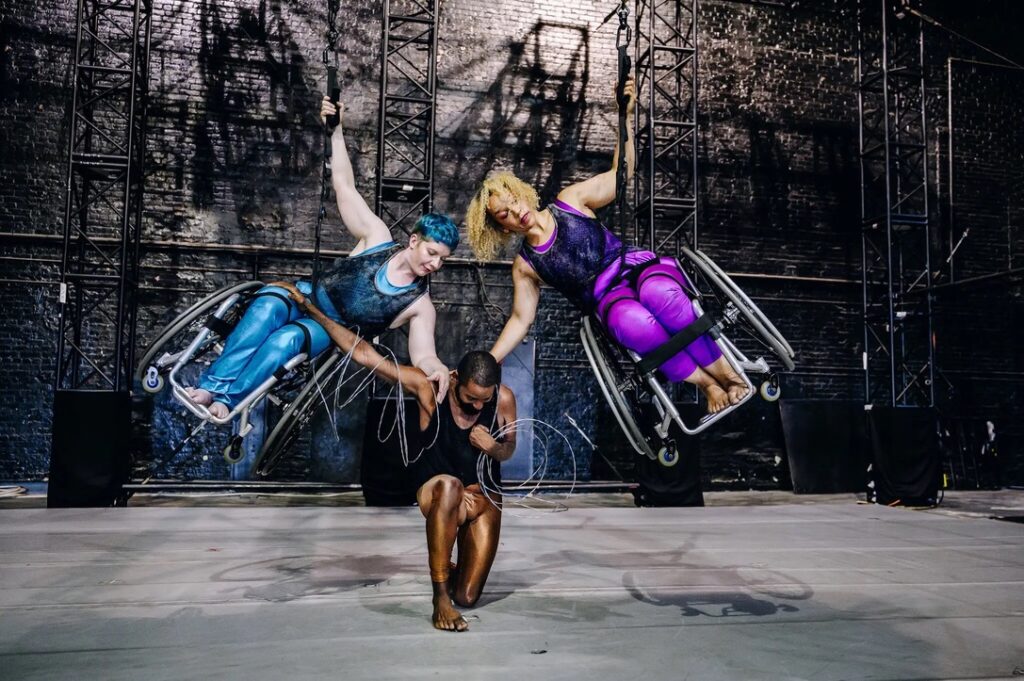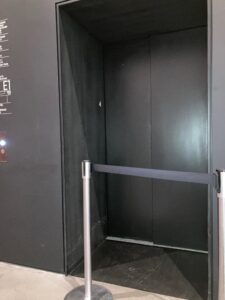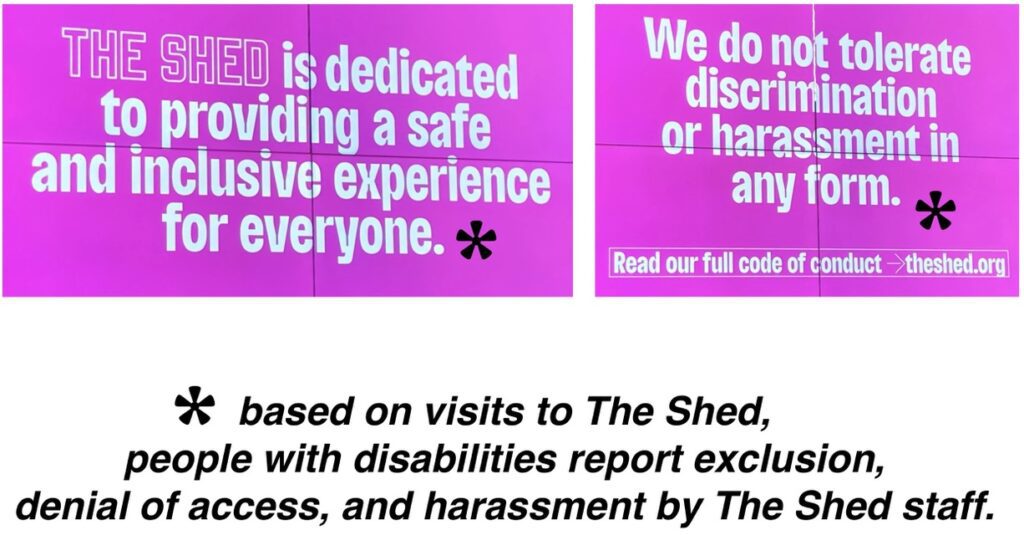

From left, Laurel Lawson, Jerron Herman and Alice Sheppard, rehearsing Kinetic Light’s “Wired,” a dance work that can also be experienced through audio description. Credit Nina Westervelt for The New York Times
People with disabilities report exclusion and inaccessibility at The Shed in NYC
I am an unabashed lover of Disabled & Deaf artists. One of my favorites is Kinetic Light, an innovative disability arts ensemble of disabled folks, who performed their aerial dance WIRED for three performances at The Shed in NYC.
I not only attended all three NYC performances in May I went to all five of their performances at the Museum of Contemporary Art in Chicago. For my health I stayed away from any indoor spaces for over 2 years, but I got a new ENVO respirator mask and Stoggles just to attend. Yes, Kinetic Light is that good.
At The Shed I observed many people with “first date” looks – that combination of flirtation, apprehension, desire and hope. Many of them dressed to impress hoping for a second date.
If they did not require any accessibility, that second date possibility was completely in their control.
But if they did require accessibility, The Shed guaranteed that their date would be unlikely to want a second date. Ableism kills dates.
On The Shed’s publicity page for WIRED, there is an extensive list of access that will be available. In all interviews, Kinetic Light discusses their commitment to providing the accessibility that audiences need which is always far beyond the legal minimums. They also state that their process is to engage with hosting venues to embrace the opportunities to bring in new audiences through providing and advertising the access that will be available at the performance.
These access provisions may include hiring Disability Access Doulas to facilitate better experiences for disabled audience members; staffing a Quiet Room; having ASL interpreters available to audiences throughout all the conversational times (before, intermission, and after the performance); Audimance, Kinetic Light’s multi-channel rich spacial audio app; haptic soundtrack interpretation (through materials placed throughout the audience); a tactile exhibit of materials used during the performance, etc.
These access features were included in the publicity for WIRED performances in Chicago and NYC. In Chicago MCA provided great access. In NYC The Shed did not.
Kinetic Light also widely advertises the accessibility options before people purchase tickets. Folks who use access features believed they would face less discrimination in Chicago and at The Shed for these performances. Based on that belief, they brought first dates to WIRED.
At The Shed their dates got a first-hand glimpse of how ableism plays out in performance spaces. The ugliness made few want to endure it again on a second date.
I’m going to give you examples from Chicago, where MCA invited the active participation of Disability Access Doulas, of which I was one, and The Shed, where they did not. The examples below are from my direct experience. They either happened to me or I watched it happen to someone else.
If you already know what I’m going to write, because you’ve experienced it yourself, you can skip to the Summary at the end.
ASL (American Sign Language) INTERPRETERS
Chicago: Interpreters, wearing ASL name tags, greeted Deaf people as they entered the building. They informed Deaf people that there would be 2 interpreters available as long as Deaf people were in the building. Deaf or hearing people could ask for interpretation at any time.
Having interpreters available for casual “What did you think of the dance?” conversations among audience members is rare. That’s why it’s important to see it listed as one of the access options on the performance information page.
The interpreters also assisted the Director by sharing her pre-performance Introduction in ASL to the audience.
The Shed: A Deaf friend arrived at the theater lobby and could not find the interpreter. He asked me to approach the staff and ask the interpreter to come to him as he had limited mobility.
The first Shed staff person said “ok” then left and never returned. After 10 minutes I approached a second Shed visitor experience staffer. They informed me “He doesn’t need an interpreter. There’s no words in the show. The interpreter will just do ASL for the pre-performance remarks.”
I told them that there were supposed to be interpreters available to the audience members. The Shed staffer said “No” and left.
I told my Deaf friend and he asked me to ask another staffer. The third Shed staffer repeated the words of the second Shed staffer.
I reported this problem (and others) to Kinetic Light staff who then relayed them to The Shed administrators. But the problem of no interpreters for the audience continued throughout all 3 performances of WIRED.
WHEELCHAIR SEATING
Chicago: Kinetic Light performances bring in many people who use the disabled seating area. This requires a floor plan detailing flexible accessible seating where clear COVID distances are created. Disability Access doulas are available in the theater to help navigate the often-changing seating arrangements in the accessible seating area.
Unlike a fixed seating area, the accessible seating areas need the flexibility to accommodate many different configurations such as different sizes of wheelchairs, needing to have a guide dog next to a seat, someone bringing their own seating (usually a lawn lounger), etc.
So while the advance plan is useful, on-site flexibility is paramount. People who sit in the accessible seating areas know this, communicate their absolute requirements (i.e. my walker must be next to me), and are nearly always kind and flexible about being asked to move to create more access.
The Chicago venue supported the Disability Access Doulas as they helped arrange (and rearrange) the accessible seating area each night.
The Shed: The Shed staff created two rows of designated “accessible seating.” They were very close together (I.e. very little leg room area) and were based on the leg room needed for a fixed seat and not any kind of accessibility need.
This meant that there was functionally no aisle in front of the people in the 2nd (back) row. The Shed staff, and not the Disability Access Doulas, controlled who sat in which row. At one performance they forced a person using a manual wheelchair to have less than 18 inches of room between her feet and the row in front of her. When other audience members pointed out that she could move to the front row if The Shed staff removed one of the removable seats, the staff refused.
Another patron brought their own seating, a lawn lounger, and began to set it up at the end of the first row where there was plenty of room. This is a common seating option for people who bring lawn loungers.
But The Shed staffer refused to allow it and forced the patron into the back “accessible” row where the low lounger effectively barred the patron from seeing any of the dancing that took place on the stage floor which was at the same level.
Perhaps most troubling was that The Shed decided that the entire audience would come and go to their seats between the two rows of seats in the “accessible” area knowing that people with disabilities have much higher rates of compromised immune systems.
This was completely preventable as there was a lot of room between the fixed seating area and the safety line at the front of the stage. Setting up the two rows of accessible seating closer to the safety line would allow a clear, unobstructed path for patrons using fixed seating without impinging on people sitting in the accessible area.
Instead of COVID precautions, audience members who sat in the “accessible” seating area got close contact (less than 2 feet) with all the the audience members sitting in the fixed seats as they entered and exited the theater.
I reported the problem (and others) to Kinetic Light staff who then relayed them to The Shed administrators. But the problems in the “accessible” seating area continued throughout all 3 performances of WIRED.


ELEVATOR ACCESS TO BATHROOMS & QUIET ROOM
Chicago: In her pre-performance remarks, the Director invited audience members to use the elevators to get to the bathrooms and Quiet Room on other floors. Elevators, which required a badge, were staffed by masked staff and available both during intermission as well as before and after the show.
The Shed: In her pre-performance remarks, the Director invited audience members to use the elevators to get to the bathrooms and Quiet Room on other floors. Elevators, which required a badge, were staffed by unmasked staff and sometimes blocked off.
The Shed staff told people who needed the elevator that they were not allowed to do so and were told they could only use the bathrooms on the theater level. Meanwhile people who could use the escalator were going to adjacent floor bathrooms.
On average there were 15 or more people who needed the accessible toilet stall at each performance. On the theater level there were only 3 accessible toilet stalls.
reported the problem (and others) to Kinetic Light staff who then relayed them to The Shed administrators. But the problem of no elevator access for the audience continued throughout all 3 performances of WIRED at The Shed.
NO SEATS WHILE IN QUEUE
Chicago: Seating was provided throughout the theater lobby area so that people could visit, seated and standing, while waiting for the theater to open.
The Shed: There is one fixed bench near the bathrooms on the theater lobby level far from the theater entrance.
On the 2nd night, the theater had a lighting problem which significantly delayed the start of the performance. As people filled the lobby, the staff directed patrons to create a queue along the wall.
Some of the people had difficulty standing and after 20 minutes in line, the person behind me requested a seat. The Shed staff said “There are no seats.” When we pointed to the loose chairs at a lobby table, the staff person said “No” and left.
When we asked again, a Shed staffer said that the person would need to leave the queue (they were near the front of a very long line) and sit alone away from their companions.
I reported the problem (and others) to Kinetic Light staff who then relayed them to The Shed administrators. But the problem of no seating while waiting in line continued through the final performance of WIRED at The Shed.
UNMASKED & PARTIALLY MASKED STAFF
Chicago: As advertised on all the publicity for WIRED, all staff were appropriately masked at all times with fitted masks that were above their noses. All patrons were required to provide proof of COVID vaccination and be appropriately masked at all times. In Chicago, this happened
The Shed: The Shed staff were rarely appropriately masked. Shed staff usually had masks around their necks, below their nose, or pulled to the side (i.e. open at the sides).
All patrons were required to provide proof of COVID vaccination and be appropriately masked at all times.
Of the three performances I was only asked for proof of vaccination on the last night. One Shed staffer had the mask around their neck. The other Shed staffer, the one who came and checked my vaccination card, wore the mask down around the mouth. They were checking my vaccination card in the doorway of The Shed.
After moving 6 feet away, I remarked on the irony of their being unmasked during a vaccination check. The Shed staffer told me “We don’t have to wear the mask unless we are inside the building.”
At least one patron entered the theater completely unmasked. They did this both at the beginning of the show and also returning from the intermission. The Shed staff who were supposed to prevent unmasked people from entering the theater, allowed the unmasked patron to enter both times.
I reported the problem (and others) to Kinetic Light staff who then relayed them to The Shed administrators. But the problem of unmasked and improperly masked staff continued through all the performances of WIRED at The Shed.
SUMMARY
Disabled people live in our bodies 24/7. We know where to sit in theaters to be the most comfortable and to allow the greatest path of travel for both disabled and non-disabled people.
In their interviews Kinetic Light acknowledges that most performing arts venues are unaware and untrained as to how to provide a positive accessible experience for their patrons. In addition to discussing the access provisions that will be provided, as shown by the list of access provisions listed on the venue’s performance information page, they also coordinate with local disability groups to support the venue through having Disability Access Doulas onsite for each performance.
The Shed’s refusal to accept this expertise, as demonstrated by their preference to have Shed staff and not Disability Access Doulas assist the audience, created an unnecessarily unwelcoming environment. The Shed’s untrained staff frequently treated disabled people, myself included, as incompetent, unwelcome, and a nuisance.
The hopes of a pleasant night out on a first date were destroyed by The Shed’s decisions.
The Shed’s large digital messages of inclusivity, projected throughout the building, is completely betrayed by my direct experience of being a disabled body in their very unfriendly ableist space.


I’m very sad that The Shed chose to take this great opportunity that offered the disability training and all the support needed to provide a model of accessibility and instead gave us an unpleasant ableist audience experience.
I will never return to The Shed.
The irony that The Shed did these horrific behaviors while hosting the NYC premiere of WIRED with Kinetic Light, a world famous disability arts ensemble, is not lost on broader disability communities.
To The Shed: May your slogans of inclusivity keep you warm at night. Because your actions tell us that Deaf & Disabled people are NOT welcome at The Shed.

Wow! Thank you so much for making this post laying all this out. I’m really taking this in. The differences are glaring and I’m disappointed and enraged that the way the shed moved is the norm. Chicago’s example gives me hope.